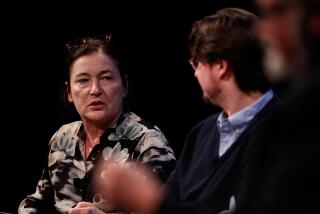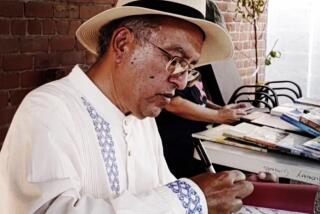Borges, Dean of Latin American Writers, Dies
- Share via
BUENOS AIRES — Jorge Luis Borges, a blind man of soaring and fantastic vision who became the dean of Latin American letters, died Saturday in Switzerland. Borges, who often complained that he had lived too long, was 86.
Death came to the master Argentine storyteller in a chalet on the shores of Lake Geneva to which he had moved only a week ago. At his side was 41-year-old Maria Kodama, whom Borges met when she was a teen-age student of literature and had employed for the past decade as a secretary and companion. They were married last April 26. “For love,” Borges said.
Borges had left his cramped and stuffy apartment in downtown Buenos Aires at the end of 1985 aware that little time remained, his lawyer, Osvaldo Vidaurre, said Saturday. He said Kodama had called him Saturday to say her husband was dead. “I feel very alone,” he quoted her as saying.
Cancer Was Incurable
“He knew he had cancer of the liver,” Vidaurre said. “Before leaving for Geneva he had undergone an analysis, including a biopsy. The doctors told him it was incurable and irreversible.”
Vidaurre said it was Borges’ wish to die and be buried in Geneva, the city where he spent his adolescence and which “he knew like the back of his hand.” Word of his fatal illness was kept secret. When a European reporter recently asked Borges how he liked Switzerland, Borges said that he was “mysteriously happy.”
By nightfall Saturday, newspapers with identical banner headlines sold briskly to Argentines lining up for movie and theater seats: “Borges Is Dead.” President Raul Alfonsin expressed sorrow, and his government issued a formal decree of mourning.
“His powerful and original influence has made itself felt in almost all of the great literature of our age,” the decree said. “It is no exaggeration to say that there is a before-Borges and an after-Borges in the style and the interests of Latin American and Spanish writers.”
Poems and Short Stories
Spurning novels, which he dismissed as too often “full of padding,” Borges focused on poems and terse, dreamlike and often ironic short stories of fantastic speculation hewn with great verbal and narrative power.
One critic called him “the founder of fabulization.” Another said he was “a jeweler of words.” The late Andre Maurois once observed that Borges had identified his own talent in describing metaphysicians on his imaginary planet Tion: “They seek neither truth nor likelihood. They seek astonishment.”
Borges won scores of awards and titles from universities around the world, but never the Nobel Prize, although he was bridesmaid for at least two decades. He once said that denying him the prize had become a Scandinavian tradition. Borges’ work in a 60-year career fills 35 volumes. In his later years, he often denigrated his early work as “overwritten . . . baroque . . . affected and dogmatic.” Those works he himself liked best included “The Cipher,” a book of poems, “The Book of Sands” and “Dr. Brodie’s Report.”
Borges was born Aug. 24, 1899, in a district of Buenos Aires called Palermo, which Borges’ stories of his youth would make famous as a knife fighters’ part of town. Today, it is a stolid burgher’s refuge.
The son of a diplomat, Borges learned English from a nanny before he learned Spanish. He spoke it with intimidating fluency and a trace of an Irish lilt. Returning to Buenos Aires from Switzerland in 1921, he edited a literary magazine and wrote poetry for a decade until turning to the short stories of a bygone, idealized Buenos Aires--work that first drew international attention.
A gradual failing of his sight blinded Borges in 1956 when he was head of Argentina’s national library. In an autobiography accompanying his book “El Aleph,” Borges acknowledged “God’s splendid irony in granting me at one time 300,000 books and darkness.” Thereafter, he dictated poems and short prose pieces.
In his later years, Borges was the undiscerning host to would-be and has-been writers, journalists, teachers, critics and nearly anyone else who asked to see him. Hands wrapped around a gnarled cane, he would hunch forward on an old-fashioned sofa and gab. Once, for a visitor, he recited “The Lord’s Prayer” in Old Norse. He liked the power of the language, he said.
As he grew older, visitors increasingly asked Borges about death. “When she was 99, my mother would lie in there every night,” Borges said one day, gesturing toward the bedroom, “and pray to die before she was 100.” Borges’ mother, Leonor, to whom he was devoted, died in 1976 before her 100th birthday.
At a literary gathering here last October, a questioner asked Borges--who variously described himself as a conservative, an atheist and an anarchist--whether the idea of death was more difficult for a non-believer.
“On the contrary,” Borges replied. “It is much easier. The believers are pretty crazy: They must be punished or rewarded. Who am I to deserve a punishment or a reward? Clearly, nobody. The fact of believing that death is absolute gives great tranquility, a great serenity. I believe that if they told me that I would die tonight, I would feel relieved, but one knows so little of oneself that perhaps I would be terrified. I don’t know, but I feel rather impatient. I have lived too long.”
More to Read
Sign up for Essential California
The most important California stories and recommendations in your inbox every morning.
You may occasionally receive promotional content from the Los Angeles Times.













